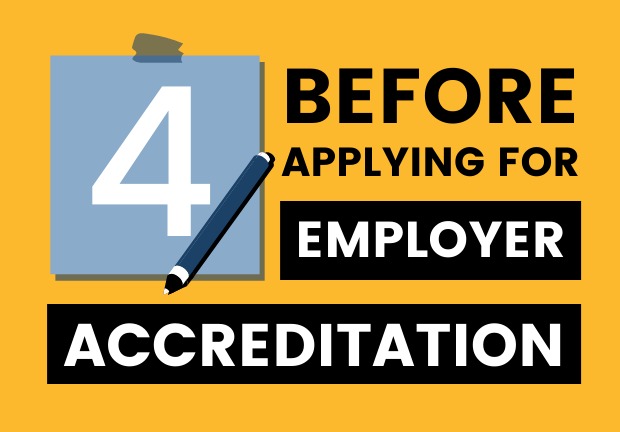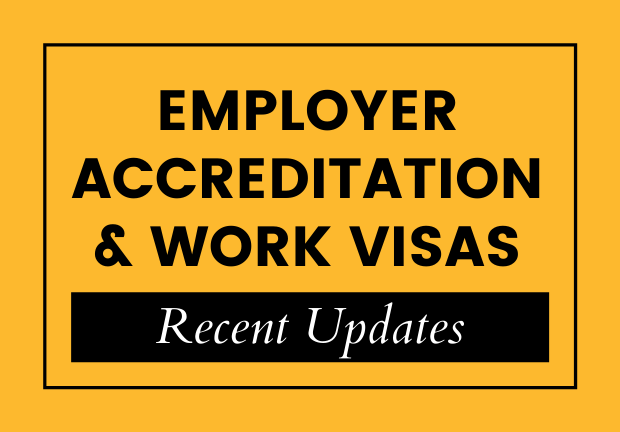Recruiting internationally? 5 things to keep in mind
10 February 2023- Written by Arunima Dhingra (Director, Licensed Immigration Adviser, #200900407)
With daily media coverage on increasing labour shortages in NZ and immigration settings finally geared towards a smoother transition for migrant workers into NZ, more and more businesses in NZ are looking at recruiting internationally.
If you are a business that is facing a labour shortage but have not started looking for talent outside our borders yet, you need to think again! Any business that is starting their international recruitment planning for 2023, should read this carefully and get ready.
And last but not the least, if you are a business where the overseas recruitment wheels are in full motion, you need to read this to be aware of the pitfalls of the new immigration framework which includes employer accreditation, Job Checks and Accredited Employer Work Visa.
Recruiting overseas is an exciting endeavor, but it can also be intimidating for those unfamiliar with the ins and outs of immigration. There are a lot of rules and regulations that must be taken into consideration when recruiting from other countries. Knowing how to navigate these regulations is key to success.
Here are five things recruiters and HR professionals must keep in mind about immigration when recruiting overseas.
1. Is the NZ employer accredited?
The first thing you need to do as a business, before you can support an international candidate to come into NZ on a work visa, is get your NZ Immigration Employer Accreditation. Here is a handy guide on what this entails and how we can help. Without Accreditation, your business cannot support a candidate to get a work visa. Once accredited, your business will need to undertake a job check for the role, which when approved will generate a token that is used to apply for a work visa. This work visa is called Accredited Employer Work Visa and is granted for 3 years.
2. Does the candidate meet the job check requirements?
Once you meet the accreditation requirement, the next step is to complete a job check for the role. The job check application asks for details of the role including pay, hours, minimum requirements and advertising if applicable.
If you are a business looking to recruit multiple vacancies under one job check, you may have only found one candidate so far and still be looking for others to fill the remaining vacancies. In such a situation, you may end up identifying candidates who would be perfect in the role with a bit of hand holding and so may not meet the exact requirements listed in the job check. Or you may wish to hire someone based on potential rather than experience. If the Job Check is not done with the idea of “Future fit” in mind, then the candidate you find might not meet the job check requirements leaving you with two options - 1) do a new job check or 2) find a new candidate. Not ideal!
3. Is the candidate’s (or accompanying family’s) background ‘immigration friendly’?
When your recruitment team goes to market looking for talent, they are looking for candidate(s) that matches the role requirements and profile, has the right attitude, the soft skills needed etc. The recruiter won't be checking a candidate’s immigration background to ensure they will be able to get an appropriate visa to come to NZ and work, mainly because it falls outside the recruiter’s area of expertise. Since the immigration industry in NZ is regulated and one has to be appropriately qualified and authorized before they provide advice, this work has to be carried out by a licensed immigration adviser, a lawyer or an exempt individual.
Consequently, a recruiter may find the best person for your role, but if that person won't be able to secure a visa for NZ, say because of a medical condition or character issue, they will not make it to NZ, taking your search back to square one.
A lesser known, but not rare, occurrence is when the candidate’s background is all good, but their family member who was going to be traveling along to NZ has an issue. For example, their child has a medical condition that may lead to issues with the NZ visa or in severe situations, not allow for a visa grant. In situations like this, the candidate may end up pulling out and decline your offer. . If this happens much later in the process, say after the offer has been accepted and the job check along with the candidate’s work visa process has begun, it leads to a waste of resources and makes it unnecessarily challenging with you having to start the recruitment process again.
This is why it is crucial that you as a business have a seamless way of checking a candidate’s (and their family’s ) immigration background before that final offer is made, ensuring that the visa process will deliver a positive outcome.
4. Do you know the laws of the country you are recruiting from?
Different countries have different laws around recruitment, especially if their workers are looking at moving internationally. Having a solid understanding of the laws of the country in which you intend to recruit before you start is crucial. For example, we regularly encounter businesses recruiting from the Philippines but they do not know about additional requirements the business needs to fulfill before their worker can fly from the Philippines to NZ.
5. Are you leaving the visa process to the candidate?
You are now an accredited employer, have done the job checks, identified the candidate and spent time and resources to find that perfect candidate. Are you now going to leave the most important part of the equation - the visa process - to the candidate to manage? Here is why this is not a good idea.
Candidates doing their work visas do not know what details were put in the job check and/or job advert apart from those that they see auto filled in their AEWV application. We come across cases on a daily basis where the candidate does not meet the requirements listed in the Job Check or if they do, they may not have the right documents to prove it. Documentation to prove work experience and qualification requirements can vary from country to country.
Most times candidates with a family would like to travel to NZ as a unit. A candidate’s decision to come to NZ by can be largely dependent on when and whether the spouse and kids can travel along.
Have you thought about who will assist with the family’s visa applications and provide advice on when the kids can start school, how long the visa process can take, where things can go wrong or what to look out for.
A candidate doing their own visa process can potentially become problematic when INZ has delays in processing and a project in NZ is starting soon for which the candidate must be here to help (as an instance). In such a situation as escalation to INZ may be needed. Not something a candidate can be expected to run with on their own.
Moving to a new country with different laws, different culture and a totally different immigration system can be daunting and risky to run without professional help. Experienced immigration advisers can manage and deliver this process end to end, whilst avoiding pitfalls, ensuring the candidate has a smooth experience from the beginning. As experienced immigration partners for many businesses across New Zealand, we ensure that all your recruitment and retention related immigration processes are completed efficiently, and provide advice promptly relieving any stress or concerns for the employer and candidate along the way. Our team is always here to help so don’t hesitate to contact us should you have any questions. To assist employers and recruiters on their immigration journey, we hold a series of webinars throughout the year - if you’d like to attend our webinars, subscribe here.

.jpg)

